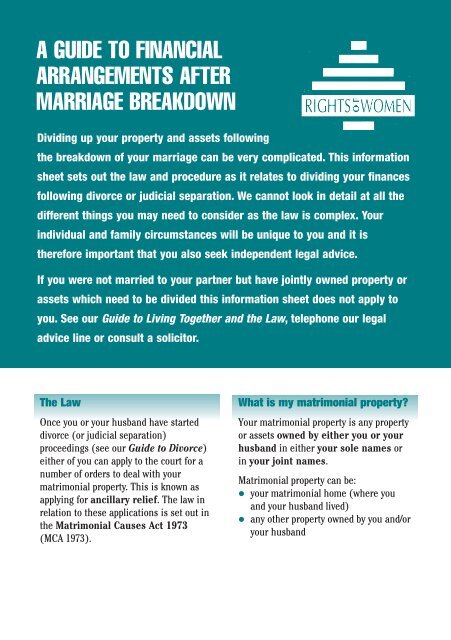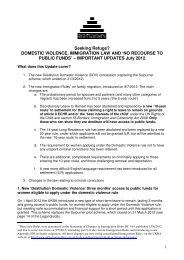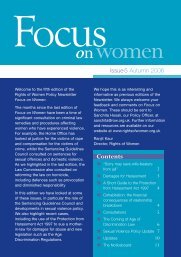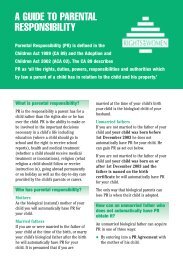Guide to Financial Arrangements after Marriage ... - Rights of Women
Guide to Financial Arrangements after Marriage ... - Rights of Women
Guide to Financial Arrangements after Marriage ... - Rights of Women
You also want an ePaper? Increase the reach of your titles
YUMPU automatically turns print PDFs into web optimized ePapers that Google loves.
A GUIDE TO FINANCIAL<br />
ARRANGEMENTS AFTER<br />
MARRIAGE BREAKDOWN<br />
Dividing up your property and assets following<br />
the breakdown <strong>of</strong> your marriage can be very complicated. This information<br />
sheet sets out the law and procedure as it relates <strong>to</strong> dividing your finances<br />
following divorce or judicial separation. We cannot look in detail at all the<br />
different things you may need <strong>to</strong> consider as the law is complex. Your<br />
individual and family circumstances will be unique <strong>to</strong> you and it is<br />
therefore important that you also seek independent legal advice.<br />
If you were not married <strong>to</strong> your partner but have jointly owned property or<br />
assets which need <strong>to</strong> be divided this information sheet does not apply <strong>to</strong><br />
you. See our <strong>Guide</strong> <strong>to</strong> Living Together and the Law, telephone our legal<br />
advice line or consult a solici<strong>to</strong>r.<br />
The Law<br />
Once you or your husband have started<br />
divorce (or judicial separation)<br />
proceedings (see our <strong>Guide</strong> <strong>to</strong> Divorce)<br />
either <strong>of</strong> you can apply <strong>to</strong> the court for a<br />
number <strong>of</strong> orders <strong>to</strong> deal with your<br />
matrimonial property. This is known as<br />
applying for ancillary relief. The law in<br />
relation <strong>to</strong> these applications is set out in<br />
the Matrimonial Causes Act 1973<br />
(MCA 1973).<br />
What is my matrimonial property?<br />
Your matrimonial property is any property<br />
or assets owned by either you or your<br />
husband in either your sole names or<br />
in your joint names.<br />
Matrimonial property can be:<br />
your matrimonial home (where you<br />
and your husband lived)<br />
any other property owned by you and/or<br />
your husband
the contents <strong>of</strong> your matrimonial home<br />
and your car<br />
any savings, life assurance policies,<br />
endowment policies, s<strong>to</strong>cks, shares or<br />
bonds<br />
any pensions<br />
The court can also look at debts owed by<br />
either you or your husband during your<br />
marriage.<br />
What orders can the court make?<br />
There is a wide range <strong>of</strong> orders the court<br />
can make <strong>to</strong> divide your matrimonial<br />
property including:<br />
transferring property in<strong>to</strong> your or your<br />
husband’s sole name<br />
transferring a tenancy in<strong>to</strong> your or your<br />
husband’s name<br />
ordering that a property be sold and the<br />
proceeds <strong>of</strong> sale be divided between<br />
you<br />
placing a legal charge over property or<br />
other assets in your or your husband’s<br />
favour<br />
payment <strong>of</strong> a lump sum <strong>to</strong> you or your<br />
husband<br />
future payment <strong>of</strong> a lump sum <strong>to</strong> you or<br />
your husband from your respective<br />
pension funds<br />
varying your or your husband’s pension<br />
provision so that you or he benefit from<br />
it<br />
ordering you or your husband <strong>to</strong> pay<br />
on-going maintenance <strong>to</strong> the other<br />
What can I do if I am worried that<br />
my husband will dispose <strong>of</strong> our<br />
matrimonial property?<br />
If you fear that your husband may dispose<br />
<strong>of</strong> your matrimonial property you can<br />
make an emergency application <strong>to</strong> the<br />
court for an injunction <strong>to</strong> freeze the assets<br />
or prevent him dealing with them.<br />
If the matrimonial home is in your joint<br />
names you have equal rights as owners<br />
and your husband will not be able <strong>to</strong><br />
dispose <strong>of</strong> the property without your<br />
consent. However, if your husband owns<br />
the matrimonial home in his sole name<br />
your right <strong>to</strong> live in the property will only<br />
continue as long as the marriage. This is<br />
called home rights and is sometimes<br />
referred <strong>to</strong> as matrimonial home rights.<br />
You can protect your rights so that if your<br />
husband tries <strong>to</strong> sell the property you will<br />
be informed and the sale will not be able<br />
<strong>to</strong> proceed without your consent. How you<br />
protect your rights will depend on whether<br />
the property is registered with the Land<br />
Registry or not. If you are not sure you<br />
can contact the Land Registry (see Other<br />
useful telephone numbers) <strong>to</strong> find out.<br />
If the property is registered at the Land<br />
Registry you should fill in an Application<br />
for registration <strong>of</strong> a notice <strong>of</strong> home<br />
rights (form HR1) and send it <strong>to</strong> the Land<br />
Registry. Your husband will au<strong>to</strong>matically<br />
be informed by the Land Registry that you<br />
have made the application.<br />
If the property is not registered the<br />
procedure is different. In this case you<br />
will need <strong>to</strong> apply <strong>to</strong> the Land Charges<br />
Department (see Other useful telephone<br />
numbers) <strong>to</strong> register a Class F land<br />
charge. The Land Charges Department<br />
will not inform your husband about this.<br />
It is essential that you use the correct<br />
procedure because otherwise your rights<br />
will not be protected. If you are unsure<br />
please telephone our advice line or consult<br />
a solici<strong>to</strong>r.
How does the court decide how <strong>to</strong><br />
divide our matrimonial property?<br />
When considering how <strong>to</strong> divide your<br />
matrimonial property the court will<br />
consider all the circumstances <strong>of</strong> your<br />
case but firstly the welfare needs <strong>of</strong><br />
any children <strong>of</strong> the family who are<br />
under 18.<br />
The court will then consider:<br />
the income, earning capacity, property<br />
and financial resources <strong>of</strong> you and your<br />
husband now and in the future<br />
the financial needs, obligations and<br />
responsibilities <strong>of</strong> you and your<br />
husband now and in the future<br />
the standard <strong>of</strong> living during your<br />
marriage<br />
your ages and the length <strong>of</strong> your<br />
marriage<br />
any physical or mental disability <strong>of</strong> you<br />
or your husband<br />
any contributions you and your<br />
husband has or will make, including<br />
looking <strong>after</strong> the home and caring for<br />
children<br />
any behaviour by you or your husband<br />
that the court considers relevant<br />
any value or benefit <strong>to</strong> you or your<br />
husband which you would lose when<br />
divorced (for example, a pension<br />
benefit).<br />
In deciding how <strong>to</strong> divide your<br />
matrimonial property the court will aim <strong>to</strong><br />
ensure that you and your husband’s<br />
financial dependence on each other ends<br />
as soon as is possible without causing<br />
hardship <strong>to</strong> either <strong>of</strong> you. Wherever<br />
possible the court will therefore try <strong>to</strong><br />
make a clean break order. This will not<br />
always be possible where there are<br />
children under 18.<br />
Behaviour and domestic violence<br />
When the court looks at behaviour in<br />
dividing your joint finances it is only<br />
looking at behaviour that directly affects<br />
your financial position. So behaviour such<br />
as attempting <strong>to</strong> dispose <strong>of</strong> or hide assets<br />
may be taken in<strong>to</strong> account when property<br />
is divided while other behaviour, such as<br />
unfaithfulness would not be. However, the<br />
courts have recently taken very serious<br />
domestic violence in<strong>to</strong> account where it<br />
has affected a woman’s earning capacity.<br />
Ancillary relief procedure<br />
Before a solici<strong>to</strong>r can properly advise you<br />
she will need <strong>to</strong> have details <strong>of</strong> both your<br />
and your husband’s financial situation.<br />
This will include details <strong>of</strong> all your<br />
matrimonial property, income and<br />
outgoings and is called financial<br />
disclosure. This process can be done<br />
through solici<strong>to</strong>r’s correspondence or<br />
through the court procedure if your<br />
husband is not cooperating. Once your<br />
solici<strong>to</strong>r has enough financial information<br />
she can begin <strong>to</strong> advise you and start <strong>to</strong><br />
negotiate a settlement with your husband.<br />
If you are able <strong>to</strong> reach agreement your<br />
solici<strong>to</strong>r may draw up a consent order<br />
setting out your agreement which is then<br />
signed by you both and sent <strong>to</strong> the court<br />
for approval by the judge. You do not need<br />
<strong>to</strong> attend court for this. Once it has been<br />
approved the consent order is legally<br />
binding.<br />
If you cannot reach agreement you may<br />
want <strong>to</strong> consider attending mediation<br />
with your husband. Mediation is a<br />
voluntary process where you and your<br />
husband have face-<strong>to</strong>-face discussions
with the help <strong>of</strong> a trained media<strong>to</strong>r and try<br />
<strong>to</strong> reach an agreement. You should always<br />
seek legal advice on any agreement you<br />
reach as your media<strong>to</strong>r is not there <strong>to</strong> give<br />
you legal advice. Any agreement you reach<br />
can be draw up in<strong>to</strong> a consent order.<br />
However, mediation will not be<br />
appropriate if you have experienced<br />
domestic violence during your marriage or<br />
if there is an imbalance <strong>of</strong> power within<br />
the relationship, for example, because you<br />
have a disability or because English is not<br />
your first language.<br />
If you cannot reach agreement either <strong>of</strong><br />
you can make a formal application for<br />
ancillary relief <strong>to</strong> the court by filling in<br />
Form A. The court will set a date for a<br />
First Appointment. You and your<br />
husband will be ordered <strong>to</strong> exchange<br />
financial disclosure on a Form E. You<br />
must send your completed Form E <strong>to</strong> the<br />
court and your husband no later than 35<br />
days before the date <strong>of</strong> the First<br />
Appointment. If you are representing<br />
yourself there are Form E (<strong>Financial</strong><br />
Statement in Ancillary Relief Proceedings)<br />
Notes for guidance <strong>to</strong> help you complete it<br />
which are available from your local Family<br />
Proceedings or County Court or from the<br />
Court Service website.<br />
If you are not happy with the information<br />
provided by your husband you can ask him<br />
further questions about his finances in a<br />
questionnaire. At the first hearing or<br />
First Appointment the judge will decide<br />
what questions are relevant <strong>to</strong> the case<br />
and which your husband should answer. If<br />
you are able <strong>to</strong> reach an agreement the<br />
judge can make a consent order.<br />
If there is further information needed and<br />
you can’t reach agreement the judge will<br />
arrange a <strong>Financial</strong> Dispute Resolution<br />
Appointment (FDR). At this hearing the<br />
judge will give an indication <strong>of</strong> how she<br />
would divide the matrimonial property and<br />
encourage you <strong>to</strong> reach agreement. The<br />
judge who sits at the FDR will not hear<br />
your case again. If you are able <strong>to</strong> reach<br />
agreement the judge can make a consent<br />
order.<br />
If you cannot reach agreement the judge<br />
will arrange a final hearing at which you<br />
and your husband may have <strong>to</strong> give<br />
evidence in the witness box. The judge<br />
will then make a decision about how your<br />
matrimonial property should be divided.<br />
Collaborative family law<br />
Collaborative family law is increasingly<br />
being used <strong>to</strong> resolve disputes <strong>after</strong><br />
relationship breakdown. It involves<br />
negotiating with your husband in a series<br />
<strong>of</strong> face-<strong>to</strong>-face meetings. Unlike<br />
mediation, in collaborative law you attend<br />
these meetings with your lawyer so you<br />
and your husband will be negotiating with<br />
each other with the help <strong>of</strong> your legal<br />
representatives, who must both be trained<br />
collaborative lawyers. The aim <strong>of</strong><br />
collaborative law is <strong>to</strong> assist people<br />
reaching a favourable solution <strong>to</strong> their<br />
dispute in a fair and transparent way. If<br />
you use collaborative family law you and<br />
your husband will sign a participation<br />
agreement, an agreement <strong>to</strong> try <strong>to</strong> reach<br />
a solution without going <strong>to</strong> court.<br />
If you are able <strong>to</strong> reach agreement your<br />
solici<strong>to</strong>r may draw up a consent order<br />
(see above). If you are unable <strong>to</strong> reach an<br />
agreement you can still apply for ancillary<br />
relief in the normal way (see above) but<br />
you will have <strong>to</strong> consult a different
solici<strong>to</strong>r because you cannot use the same<br />
solici<strong>to</strong>r who assisted you in negotiations.<br />
If you have experienced domestic violence<br />
then resolving financial or other matters<br />
though collaborative law will not be<br />
appropriate.<br />
Maintenance while your case<br />
progresses<br />
If you have been financially dependant on<br />
your husband you can apply <strong>to</strong> the court for<br />
maintenance until a decision is made<br />
about how your joint property is <strong>to</strong> be<br />
divided. This is sometimes called an<br />
application for maintenance pending<br />
suit. Your husband can be ordered <strong>to</strong> pay<br />
you any amount <strong>of</strong> maintenance that is<br />
reasonable for your needs. This can<br />
include an amount <strong>to</strong> help you pay your<br />
legal costs. However, maintenance will only<br />
be paid until your joint property is divided<br />
and the fact that you receive maintenance<br />
during your ancillary relief case does not<br />
au<strong>to</strong>matically mean that you will receive it<br />
in the long term.<br />
How much will my case cost?<br />
In general the court will not make orders<br />
for costs in ancillary relief proceedings;<br />
this means that each party will pay their<br />
own costs. It is impossible for us <strong>to</strong> give an<br />
estimate <strong>of</strong> how much your case will cost.<br />
This will largely depend on the hourly rate<br />
<strong>of</strong> your solici<strong>to</strong>r and how long the matter<br />
takes <strong>to</strong> be resolved. You may, however, be<br />
eligible for public funding (legal aid) and<br />
should ask a solici<strong>to</strong>r <strong>to</strong> do an assessment.<br />
The court may make an order for costs in<br />
ancillary relief proceedings if it is<br />
appropriate <strong>to</strong> do so because <strong>of</strong> the<br />
behaviour <strong>of</strong> one <strong>of</strong> the parties in relation<br />
<strong>to</strong> the court proceedings. For example, if<br />
either party fails <strong>to</strong> comply with a court<br />
order it may be ordered <strong>to</strong> pay some <strong>of</strong> the<br />
other party’s costs.<br />
<strong>Financial</strong> support for children from<br />
a marriage<br />
The law relating <strong>to</strong> financial support for<br />
children is in the process <strong>of</strong> change. The<br />
courts currently have only limited powers<br />
<strong>to</strong> make orders for child maintenance.<br />
Please see our <strong>Guide</strong> <strong>to</strong> Child Support or<br />
telephone our legal advice line.<br />
The law relating <strong>to</strong> this issue can be<br />
complex and we have provided a very<br />
basic overview <strong>of</strong> the terminology, law<br />
and court practice and procedure. We<br />
would strongly advise you <strong>to</strong> seek legal<br />
advice by either telephoning our legal<br />
advice line or a solici<strong>to</strong>r.<br />
Please note that the law as set out in this information sheet is the law as it<br />
s<strong>to</strong>od at the date <strong>of</strong> publication. The law may have changed since then and<br />
accordingly you are advised <strong>to</strong> take up <strong>to</strong> date legal advice. <strong>Rights</strong> <strong>of</strong> <strong>Women</strong><br />
cannot accept responsibility for any reliance placed on the legal information<br />
contained in this information sheet. This information sheet is designed <strong>to</strong> give<br />
general information only.<br />
© <strong>Rights</strong> <strong>of</strong> <strong>Women</strong> January 2007
For free confidential legal advice on family law including divorce and relationship<br />
breakdown, children and contact issues, domestic violence and lesbian parenting call<br />
the <strong>Rights</strong> <strong>of</strong> <strong>Women</strong> Advice Line on 020 7251 6577 (telephone) or<br />
020 7490 2562 (textphone).<br />
Tuesday, Wednesday and Thursday 2pm – 4pm and 7pm – 9pm<br />
Friday 12 noon – 2pm<br />
For free confidential legal advice on sexual violence and the criminal law please call<br />
our Sexual Violence Advice Line on 020 7251 8887 (telephone) or<br />
020 7490 2562 (textphone).<br />
Mondays 11pm – 1pm, Tuesdays 10am – 12 noon<br />
Other useful telephone numbers<br />
Child Support Agency 08457 133 133 www.csa.gov.uk<br />
Collaborative Family Law Group<br />
www.collablaw.org.uk<br />
Community Legal Service Direct 0845 345 4345 www.clsdirect.org.uk<br />
(for finding a solici<strong>to</strong>r)<br />
Department <strong>of</strong> Work and Pensions 0800 882200 www.dwp.gov.uk<br />
(Benefit Enquiry line)<br />
Her Majesty’s Court Service<br />
www.hmcourts-service.gov.uk<br />
Land Registry<br />
www.landreg.gov.uk<br />
Land Charges Department 01752 636666 www.landreg.gov.uk<br />
National Debtline 0808 808 4000 www.nationaldebtline.co.uk<br />
National Domestic Violence Helpline 0808 2000 247 www.womensaid.org.uk<br />
National Family Mediation 01392 271610 www.nfm.org.uk<br />
Relate 0845 130 40 16 www.relate.org.uk<br />
Resolution 01689 820272 www.resolution.org.uk<br />
(for finding a family solici<strong>to</strong>r)<br />
Samaritans 08457 909090 www.samaritans.org.uk<br />
Shelterline 0808 800 4444 www.shelter.org.uk<br />
<strong>Rights</strong> <strong>of</strong> <strong>Women</strong>, 52-54 Feathers<strong>to</strong>ne Street, London EC1Y 8RT<br />
Office/Admin: 020 7251 6575/6 Textphone: 020 7490 2562<br />
Fax: 020 7490 5377<br />
Email: info@row.org.uk<br />
Website: www.rights<strong>of</strong>women.org.uk<br />
Industrial and Provident Society No: 23221R
















